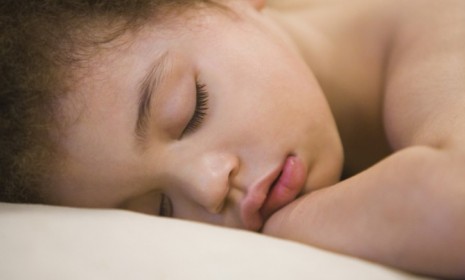Does snoring make kids crazy?
A new study suggests that children with behavior problems might just need a good night's sleep

A free daily email with the biggest news stories of the day – and the best features from TheWeek.com
You are now subscribed
Your newsletter sign-up was successful
Children with sleep disorders don't just keep their parents — and themselves — from getting enough sleep. A new study in the journal Pediatrics suggests that sleep apnea, problem snoring, and other nighttime issues can make little ones far more likely to have behavioral problems later in childhood. Can sleep problems really cause your child to "grow up a wee bit crazy"? Here's what you need to know:
Do a lot of children have sleeping problems?
Quite a few do. Roughly one in 10 children regularly snores, and up to 4 percent suffer from sleep apnea, meaning that their breathing is obstructed — and occasionally stops — during sleep. In children, the condition can be caused by enlarged tonsils or adenoids, and results in snorting or gasping for breath, which gets the air flowing, but interrupts sleep.
The Week
Escape your echo chamber. Get the facts behind the news, plus analysis from multiple perspectives.

Sign up for The Week's Free Newsletters
From our morning news briefing to a weekly Good News Newsletter, get the best of The Week delivered directly to your inbox.
From our morning news briefing to a weekly Good News Newsletter, get the best of The Week delivered directly to your inbox.
This can result in behavior changes?
Absolutely, according to the study. Researchers looked at data on the sleep patterns and behavior of 11,000 British children, and found that those with breathing issues during sleep were 40 percent to 100 percent more likely to develop "neurobehavioral problems" — such as hyperactivity — by age 7.
Why does sleep affect behavior?
The study's lead researcher, Dr. Karen Bonuck of the Albert Einstein College of Medicine at Yeshiva University in New York, said that disrupted breathing during sleep can impede the development of young brains by disrupting their supply of oxygen or balance of chemicals in the brain. It can also simply interrupt the "restorative processes" of sleep, leaving kids unrested and cranky.
A free daily email with the biggest news stories of the day – and the best features from TheWeek.com
Seems logical. Is this really such an important discovery?
It could be, Bonuck says. "Until now," she says, "we really didn't have strong evidence that sleep-disordered breathing actually preceded problematic behavior such as hyperactivity." As a consequence, many kids have been diagnosed with ADHD and potentially medicated unnecessarily, says Marianne Davey of the British Snoring and Sleep Apnea. "This is wrong," Davey says, "as if the sleep problem is addressed, the behavior will improve almost immediately."
-
 Samurai: a ‘blockbuster’ display of Japanese heritage
Samurai: a ‘blockbuster’ display of Japanese heritageThe Week Recommends British Museum show offers a ‘scintillating journey’ through ‘a world of gore, power and artistic beauty’
-
 BMW iX3: a ‘revolution’ for the German car brand
BMW iX3: a ‘revolution’ for the German car brandThe Week Recommends The electric SUV promises a ‘great balance between ride comfort and driving fun’
-
 Munich Security Conference: a showdown between Europe and Trump?
Munich Security Conference: a showdown between Europe and Trump?Today’s Big Question Report suggests European leaders believe they can no longer rely on the US for military support – but decoupling is easier said than done